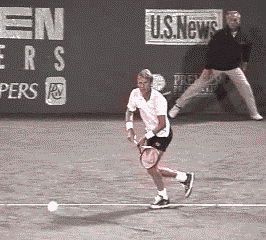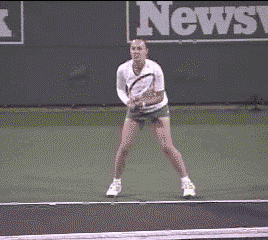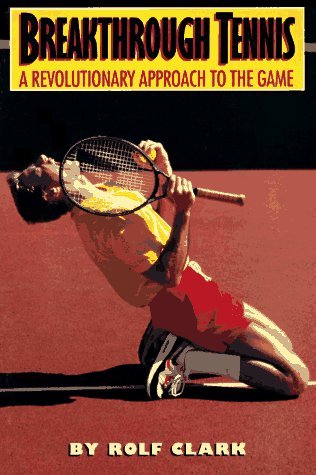TennisOne Lessons
![]()
Improving Concentration
Rolf Clark
Don't concentrate on winning points. It distracts you from concentrating on hitting through the ball.
Ignore the tennis tip "play tough on the big points." It sounds pithy, but standing by itself it's meaningless. How do you play tough? What exactly do you concentrate on? What should your eyes watch and mind pay attention to? What actions do you take to play tough?
For many, it means "try harder." Does that mean to run faster and hit harder? Does it require hitting differently from how you have been hitting?
 Bjorn Borg said he played the big points the same way he played every other point. |
Bjorn Borg, who won five Wimbledons and six French Opens supposedly, said he played the big points the same way he played every other point.
I interpret that to mean that if you think about playing tough on the big points, it will distract you from what you always should be doing -- getting to and hitting the ball.
If for no other reason, concentration should be the same on all points because that simplifies your game. You unnecessarily complicate your concentration if you need to think differently about big points, ordinary points, game points, and match points.
Beware of Aiming
We all would like to hit the ball to a place on the opponent's court so it can't be returned. That's one sure way to win points. But the fact is that focusing too much on hitting to the open court is a mistake. More often than not we'll mis-hit the ball because we tried to aim it somewhere. Being distracted by the wish to hit a winner prevents concentrating on the actions involved in hitting the ball.
Zen master Eugen Herrigal in Zen in the Art of Archery offers that the reason the student cannot hit the target is because he keeps trying to hit the target. The student would do better to pay attention to perfecting how he pulls the bowstring, how he grips the bow, and how he releases the arrow. These are actions. Hitting the target is not an action, but a result, a wish, a desire. Focusing on the result instead of the action leads to not perfecting the action and, therefore, not achieving the result.
Click photo: Zen master Eugen Herrigal offers that the reason the student cannot hit the target is because he keeps trying to hit the target. |
In tennis, a focus on aiming the ball – instead of on hitting it -- creates at least three difficulties. One is obvious: you put your attention on your target, instead of on the impact point, decreasing the likelihood of a solid impact. The second is that even if your eyes are on the ball, your mind is on the target and not on the action of driving the racquet through the ball. The third difficulty is more complicated.
If you aim at a certain point, such as the open court, you must get yourself not only in a position to meet the ball but into a position so that the ball goes where you're aiming. If, however, you focus solely on driving your racquet through the ball, you need only get into a position to meet the ball rather than meet it and put it somewhere specific. You are faced with one task, not two. Moreover, it is easier to get into position to simply hit the ball than to line yourself up in a position to hit the ball to a specific area. The intermediate player should let the ball decide what shot will be made. Don't think about what you need to do - - such as getting the ball back, passing your opponent or aiming – and focus only on the ball and your driving your racquet through it. So what if the ball goes straight at your opponent? There's a good chance it will be so well hit that the best he can manage is a run-of-the-mill return.
This is not to say that you should not aim. If the opportunity beckons-your opponent, for example, has left one side of the court completely uncovered and you have the time, you can decide to put the ball in the open court.
But that decision is made before you start the hitting process. It is made as your opponent hits. And once you have the target, stop thinking about it. Concentrate exclusively on driving the racquet through the ball.
Don't Be Too Concerned with Tactics
Click photo: Lleyton Hewitt can make his tactics work. Most of us, will just mis-hit the ball. |
Tactics are great for the advanced player. They are the bane of the rest of us. Thoughts on tactics crowd out your concentration when you hit the ball. Tactics are for players who already possess excellent control and concentration. Lleyton Hewitt can make his tactics work. Most of us, when we get too tactical, mis-hit the ball. The tactics would have been great -- if we had been able to execute them.
Better to put a well-hit ball over the net in the center of the court than to mis-hit what would have been a dazzling winner along the line. How many times has your doubles partner said, "You had the right idea," after you'd missed a delicate tactical ploy and lost the point?
Concentrate on "Do's," Not on "Don’t's"
Several years ago I played two doubles matches on the same day, a day on which I was playing poorly. Each of my partners tried to help me -- in different ways. One worked, the other didn't.
One partner kept saying: "Don't be intimidated." We lost that match. The other partner told me: "Move your feet." We won that one.
Moving my feet was affirmative. It was something I could do. It was something I could specifically concentrate on.
"Don't be intimidated," on the other hand, gave me nothing to focus on. It gave me something not to do but gave no hints on how not to do it. It didn't tell me what to concentrate on to keep from being intimidated.
In the heat of play, concentration needs to be focused on actions that are do-able. "Don't be nervous," "don't hit to her forehand," and "don't be intimidated" are "don't's." They are not actions you can focus on. In fact, they distract you from hitting the ball well by making you think about something not directly related to hitting the ball. Consider "don't hit to his forehand." If you think about that as you hit, than you are not focusing on making a clean impact.
On the other hand encouragement such as "get your racquet into position," and "drive your racquet through the ball" are actions you can do. They are directed toward helping you hit the next ball.
I cannot stress this matter of distraction enough, particularly to the average (say 3.5 level) player.
Stop Saying, "Just Get the Ball Back"
Sometimes we confuse results with actions. In doubles, for example, you will hear someone tell his partner, "Just get it back." We often say that to ourselves when we're in a tough match, missing service returns.
That's counterproductive. Getting the ball back is a wish, not an action. The action you really need is drive your racquet through the ball. That will make the ball go back most of the time. It puts a lot of pressure on your partner to say, "Just get it back." If he or she doesn't, it's another failure and makes the next return even more difficult.
Do your partner a favor. Let him (or her) know that he needn't worry about getting it back. Tell him that the only thing both of you should be doing is getting the racquet into position and then driving it through every ball.
 Pros like Martina Hingis have developed muscle memory through years of practice. |
Avoid Other Distractions
Concentration is not easy. Too many other thoughts get in the way. The basics of the physical game, that is balance and timing and the like, are useful to think about during practice but they don't belong in your mind during a match. You develop them through exploration during practice with the eventual aim of having them become part of your muscle memory. That means your body will automatically execute them without your mind needing to focus on them. And that is one reason, by the way, for practicing. You need to have time to groove your physical game.
But if your mind dwells on physical techniques during a match, you will likely be thinking about such mechanical steps as:
- "Get sideways to the net."
- "Be sure to follow through."
- "Keep a firm wrist."
Thinking about results also gets in the way:
- "I'll hit it to the open court."
- "I'll lob it over his head."
- "This one's a put-away."
And then there are those hidden and not-so-hidden concerns about self-image:
- "That's the third return I've missed, I can imagine what my partner is thinking."
- "Game point. Am I going to blow it?"
- "Here I go. I'm going to lose to him again."
All of these will cost you games if you think about them during a match. The way to concentrate on the right thing is to become aware of your thoughts as you play. Find out what your mind and eyes focus on. Become good at recalling what your mind was doing when you missed the shot. Most of us soon find that too often we do not focus on the actions that make a difference, like on hitting when you're hitting. If you're aiming when you should be hitting, become aware of that.
Over time, this awareness will cause a change in your concentration from being distracted, to being focused on the two physical components that are really useful during a match: Getting your racquet into position to hit and then driving it through the ball.
Your comments are welcome. Let us know what you think about Rolf Clark's article by emailing us here at TennisOne.
![]()
 Dr. Rolf Clark taught systems thinking at The George Washington University and while there became a ranked senior tennis player. His book, Breakthrough Tennis, A Revolutionary Approach to the Game, approaches tennis from a “feel-your-swing” viewpoint, as opposed to a “do-the-mechanics” viewpoint. It argues that being aware of and exploring your own timing, balance, and concentration is crucial to achieving breakthroughs.
Dr. Rolf Clark taught systems thinking at The George Washington University and while there became a ranked senior tennis player. His book, Breakthrough Tennis, A Revolutionary Approach to the Game, approaches tennis from a “feel-your-swing” viewpoint, as opposed to a “do-the-mechanics” viewpoint. It argues that being aware of and exploring your own timing, balance, and concentration is crucial to achieving breakthroughs.
